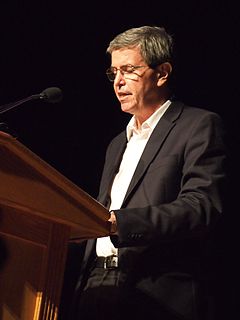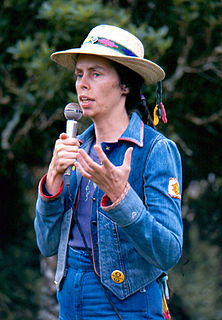A Quote by Yuval Noah Harari
About 15,000 years ago, humans colonised America, wiping out in the process about 75% of its large mammals. Numerous other species disappeared from Africa, from Eurasia, and from the myriad islands around their coasts. The archaeological record of country after country tells the same sad story.
Related Quotes
A few years ago, they [Neandertals] were thought to be ancestral to anatomically modern humans, but now we know that modern humans appeared at least 100,000 years ago, much before the disappearance of the Neandertals. Moreover, in caves in the Middle East, fossils of modern humans have been found dated 120,000-100,000 years ago, as well as Neandertals dated at 60,000 and 70,000 years ago, followed again by modern humans dated at 40,000 years ago. It is unclear whether the two forms repeatedly replaced one another by migration from other regions, or whether they coexisted in some areas
The Creator would appear as endowed with a passion for stars, on the one hand, and for beetles on the other, for the simple reason that there are nearly 300,000 species of beetle known, and perhaps more, as compared with somewhat less than 9,000 species of birds and a little over 10,000 species of mammals.
Thirty years ago, if you said the country was living beyond its means, people would have thought about economics. Now, if you talk about the country, or the planet living beyond its means, you think about the environment. We are taking out more than we are giving back. We are consuming energy, water, and other natural resources in a way that is leading to huge and often irreversible damage to the planet. So too are most other developed nations. And so too will China and India if they follow the same path of economic development as us
We know little of the consequences of the geoengineering process, such as spraying particles into the atmosphere that shade the planet from the sun's rays and could decrease its temperature. But this process is how dinosaurs disappeared from the Earth about 60 million years ago, by particles spewed by a volcano or a giant meteorite impact, and our species could follow suit.
Iraq is fragile and may fall back into a devastating setting. We're not making the kind of progress in Afghanistan that had been promised. And our esteem around the world has fallen. I can't think of a major country. It's hard to think of a single country that has greater respect and admiration for America today than it did five years ago when Barack Obama became President. And that's a very sad, unfortunate state of affairs.
South America had been an island continent, far bigger and far more diverse than Australia, for tens of millions of years before the Isthmus of Panama rose just a couple of million years ago. The resulting flood of North American mammals across the new land bridge corresponds in time with the decimation of the native South American fauna. In fact, most large mammals generally considered distinctly South American... are all recent migrants from North America.
All the things that we've done as a species have had a limited scope. We're talking about melting the ice caps, raising the level of the seas dramatically, changing the distribution of every other species on Earth, perhaps wiping out one-third or half of them. The changes at work are geologic in scale. The level of change required to deal with it is enormous, too. It will require change in every country. It will require a degree of global cooperation that we haven't seen before.
In America, we happen to be living in a third world country from the point of view of economic and social development. I came back from New York yesterday and I took the fastest train in the country, the Acela. My wife and I took the New York-Boston train sixty years ago - it wasn't called the Acela then - and I think it's improved by about fifteen minutes since then. Any other country in the world would be about half the time. In fact when it's riding along the Connecticut turnpike it's barely keeping up with traffic, which is just scandalous.





































